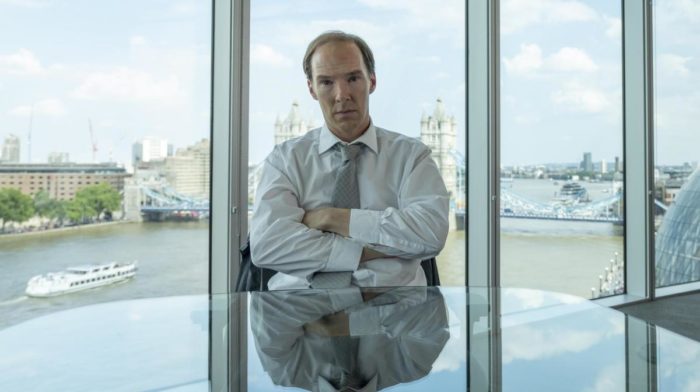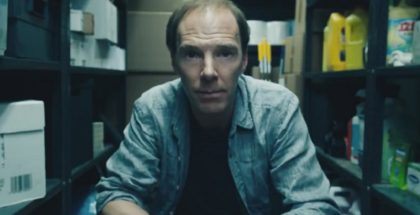UK TV review: Brexit: The Uncivil War
Review Overview
Cast
8Script
8Importance
8David Farnor | On 14, Jan 2019
“Referendums are a dumb idea. They reduce complex political decisions to a simple binary choice.” That’s Dominic Cummings (Benedict Cumerbatch) in Brexit: The Uncivil War, Channel 4’s drama about the vote to take the UK out of the European Union. Ever since the vote’s result (51.9% leave, 48.1% remain), the country has become increasingly divided by pro and anti-EU opinions, opinions that some have held for decades and others have only held since the referendum campaigns began.
In the two years following the vote, a number of truths have come to light about the campaign itself: compromised personal data usage and misleading numerical figures were all at play, as well as significant over-spending, and the Vote Leave group was has even been referred to the police by the Electoral Commission for breaking electoral law. As a result, the narrative from Remain voters has fallen into its own biforked branch: if you voted Leave, goes the thinking, you’re either xenophobic or gullible. Brexit: The Uncivil War succeeds because it refuses to pander to such bipartisanship, shirking patronising condescension or righteous edification in favour of something far more nuanced. Things, it shows us, are much more complicated than we want to think – and, after two years of this debate, it’s telling that lots of people really don’t want to think about it anymore.
And so The Uncivil War’s focus isn’t on Boris Johnson, Michael Gove or Aaron Banks (the co-founder of Leave.EU – which lost out to Vote Leave as the official anti-EU campaign group). Instead, our attention is placed on Dominic Cummings, the campaign strategist who previously worked for the Department of Education and was brought on board to help lead the country away from the continent. A controversial outcast, he was the one who coined the slogan ‘Take Back Control’, which The Uncivil War positions (not incorrectly) as the key to swaying undecided voters.
It’s a smart slogan, because no matter how much over-spending or micro-targeting on social media amplified the message, it remains one that undeniably struck a chord. And it’s this acknowledgement that makes Channel 4’s drama so effective. Playwright James Graham, who most recently penned the remarkably insightful Quiz, is a master at dissecting politics and human behaviour, and he, not unlike Cummings, compellingly captures the the state of the nation pre-Brexit.
Feeling alienated and left behind by a government pushing austerity on one hand and taking away benefits with another, large swathes of the country were ready to put the blame for how tough things have become onto one big enemy. It’s an inbuilt human trait – James Baldwin wrote decades ago about society’s need for The Other, a figure that represents what you’re not, so you can feel more certain about your own identity, whether that’s on an individual or national level. Couple that with humanity’s long-standing knack for inequality in society – not to mention the more isolated nature of life in a digital, socially-networked age, and an increasingly dizzying global stage of threats and radicalised views – and you’ve got a bubbling cauldron of disempowerment and resentment (particularly in the hardest-hit bits of Britain), plus a vague longing for a time gone by, when things weren’t like this, when things were simpler, when things made more sense.
While Cummings tapped into that sentiment, Westminster’s bubble failed to recognise or understand it, something that’s made clear by Rory Kinnear’s superb performance as David Cameron’s director of communications, Craig Oliver. The most explicitly dramatised moment in the carefully researched drama is a conversation between these two men in a London pub, as they trade perceptions of the country at large. Oliver cannily observes that Cummings has steered away from anti-immigration messages, so that the UKIP side of the campaign can do it anyway at arm’s length, but he doesn’t clock how Cummings’ team is using Facebook advertising to display the right political message to the right demographic, without having to canvas door to door.
All of this could seem like a glamorised Social Network-style thriller, about the ridiculed savant who saw the future coming, but Cumberbatch humanises Cummings, without angling for sympathy or heroics, just as Kinnear portrays his government employee as a well-meaning fellow, but with an Achilles heel of arrogance about the previous campaigns he’s won. Graham introduces the others with a more playful tone, branding each major figure as Leave or Remain when we first meet them – save for Johnson and Gove, who are merely adorned with question marks about what they truly believe. Paul Ryan’s take on Nigel Farage, meanwhile, is amusing larger-than-life, pathetically self-serving and yet not grotesquely villainous or in thrall to his self-cultivated ‘rogue outsider’ image.
While there are shades of grey everywhere, though, the response to the TV movie has, all too fittingly, fallen into two extreme sides: those who think that not enough was made of the Leave campaign’s crimes (although the drama literally spells them out on screen), and those who think that the long-term Brexit campaigners weren’t given their due in the light of Cummings’ work. But to dismiss the drama as not enough of one thing or too much of another is to miss what it’s doing – the news may tell us that Britain is a divided nation, with everyone falling into one of two camps, but art is more complex than that, just like the myriad factors that led to the referendum result in 2016. “I am sick of feeling nothing, like I have nothing,” cries one woman during a focus group session halfway through the drama, and it’s this heartbreaking scene that sticks with you after credits have rolled – a moving reminder that, while it’s tempting to frame the world through the lens of the referendum, not everything has to be a question of binaries. People didn’t just have to dislike foreigners or be foolish enough to believe what they were told in order to vote ‘Leave’ – they could be both, or neither, or the sum of all three. Even if someone did buy into the lies, that doesn’t invalidate the struggles they faced (and likely continue to face) that made the purchase easier.
The result is a witty, entertaining, important drama that stays commendably objective but, crucially, never detached; it’s a document that charts a decisive moment in British history, chronicling the rise of a culture in which people don’t trust or believe anything, and warning of a politics that’s “unsophisticated, uncivilised, but, worst of all, unkind”. During a golden age of TV, at a time when it’s easier than ever to disengage with the world and retreat into one’s own narrative, The Uncivil War is a must-see call to re-engage, reappraise and reconnect with the bigger picture of the UK, whether that’s inside the EU or out of it. Referendums are a dumb idea. Watching this isn’t.
Brexit: The Uncivil War is available on BritBox UK, as part of a £5.99 monthly subscription.























